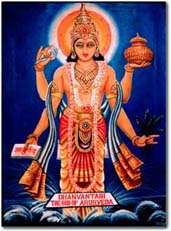
What is Ayurveda?
Charak Samhita 1:81
The Sanskrit word ayur means duration of life. The verbal root of veda means knowledge. Thus, the word Ayurveda refers to the science of the duration of life, better known as health science. This science, as presented in ancient Sanskrit texts, has been passed down through the ages and is still very relevant to human society today.
Ayurveda literally means the "science of life, longevity and self-healing". It is a traditional system of natural healing and natural medicine of India. "Ayur" means life or longevity and "Veda" means knowledge, wisdom or science. Ayurveda is a part of Vedic Science.
Whole Vedic science is the advanced system of Yoga, philosophy, prevention and cure of various diseases through natural healing which is used for the development of higher consciousness. Vedic science is a classical Yogic science and Ayurveda is related to the medical and healing side of the Yogic science. It also gives us ways and means of how to take care of the mind, the various organs of the body and the five senses, etc. The main aspects of Ayurveda pertain to how to attain maximum longevity for the pursuit of Yoga and how to achieve the aims of life through understanding certain yogic disciplines. Life energy is one of the most important factors and the root cause of the quality of life. The way we feel or think depends upon our life energy. If we know how to maintain the energy level in a harmonious way depending upon the situation and atmosphere around us, we may feel peaceful, cheerful and balanced which will lead to the attainment of perfect health. Ayurveda explains how to create a balance between body, mind and soul as well as how to maintain our balance relative to Mother Nature. The universal law is based on Vibration and Energy. The cosmic creation and consciousness is the manifestation of energy in the form of Vibration. In our life it works through the frequencies of the five elements known as air, fire, water, earth and ether.
Ayurveda believes that wrong use or non-use of the senses leads to disharmony. Therefore, it is necessary for us to know how to use the senses properly, as is described in Ayurveda.
Tridoshas (5-element theory): Determining Vata-Pitta-Kapha:
The body is composed of the pancha maha-bhutas, or five gross elements of material energy: air, fire, water, earth and ether. The three modes of nature, (sattva, rajas and tamas) combined with the five gross elements to form subtle energy principles, is called Tri-dosha in Ayurveda. It is the five elements that are responsible for the particular nature, or prakriti, of our body.
Tri-doshas are the three energy principles: Vata, Pitta and Kapha. In English, these terms are known as air, bile and mucus, but in fact they are the energy principles that help produce and distribute these substances along with others, to keep the body healthy.
Everyone will agree that there are various miseries caused by our body and mind. These are known as adhyatmika pains. Ayurveda is a simple way of analyzing the causes of these various miseries, and thereby treating the very root of any disease. Modern medicines merely treat and temporarily abate the symptoms of disease.
For example, headaches are often caused by a build-up of unwanted, putrefied foods in the intestinal tract. Modem aspirins or pain relievers only stop the pain in the head, which is just a signal warning of bad digestion. Ayurveda recommends digestive aids that naturally increase digestive fluids, thus curing the problem with no unhealthy side effects. This is only one of innumerable examples.
According to the Ayurveda, some of the popular "health foods" of today are not actually good for your health at all. Western "health food" advocates generally the same kind of food for everyone. However, according to Ayurveda, the constitution of your body determines what food is good for you. There are five elements which constitutes the bodily make up: air, fire, water, earth & eather. Basically there are three kinds of people, depending on which elements are predominating:
AIR People (Vata): Generally underweight, skinny, with thin bone structure. Philosophical, loves travelling, emotional, sentimental and artistic. Prone to rheumatic pains, heaviness, gas, rough skin, weak digestion and nervousness.
FIRE People (Pitta): Moderate in weight, with strong bone structure. Technical, sportive, intelligent, energetic, hard working, tendency for leadership. Prone to allergies, skin diseases, headache, acidity, etc.
WATER & EARTH People (Kapha): Generally overweight, heavy, with thick bone structure. Business minded, very creative, diplomatic, quick in money making, tactful. Prone to blood circulatory disorders, heart diseases, muscular pains, mucus, etc.
All these three types of people need three different kinds of food:
AIR People needs hot, spicy, fatty and heavy food items. They eat little but many times a day, like a bird, because the air is cold in its effect.
FIRE People likes cold food like salads, ice creams, fruits, juices, liquids. They eat heavy meals only two or three times a day, because fire digests food easily.
WATER & EARTH People likes cakes, sweets, grains, beans, vegetables. They eat a lot several times a day, because their body demands more and more.
If we know how to choose right dietetic regimen according to our body constitution we can save ourselves from various kinds of diseases and increase our longevity.
Ayurveda guides us how to maintain our body through selected food items according to activity, season and age. What food would be good in which climatic condition of the world, etc.